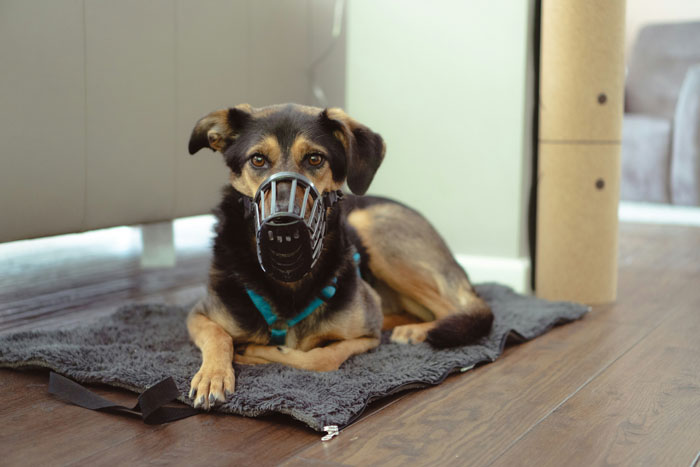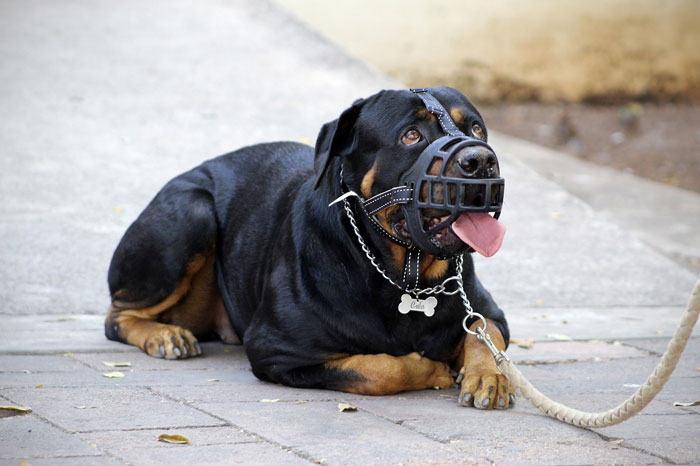
Do Muzzles Stop Barking and Should You Do It, Explained By a Vet
Imagine seeing a dog sporting a muzzle. What’s your first thought? Concern? Fear? Maybe you assume the dog must be dangerous. But what if there’s more to the story? The truth is, that many people misunderstand what a muzzle means and why a dog might need one.
As a veterinarian, I’ve seen the power of muzzles – but also the problems that happen when they’re used for the wrong reasons. If your dog’s barking is driving you crazy, you might be tempted to try a muzzle to stop barking. But will it work? The answer isn’t so simple.
- Muzzles can reduce bark loudness but don't address the real issue behind barking.
- Using a muzzle for barking can increase a dog's anxiety and worsen behavior.
- Muzzles are not meant for long-term use as they restrict panting, drinking, and eating.
The key lies in why your dog is barking in the first place. A muzzle might mask the noise, but it won’t solve the underlying issue. Let’s dive in and bust some myths about muzzles – because getting to the root of your dog’s barking is the real way to find peace and quiet.
The information provided herein is for informational purposes only. Please refer to our disclaimer for more details..
- Do Muzzles Stop Your Dog from Barking?
- Why Muzzles Are Not the Answer for Stopping Barking
- Should You Use a Muzzle for Your Dog to Stop Barking?
- Effective Alternatives to Using Muzzles for Stopping Barking
- Types of Best Dog Muzzles: Choosing Safety and Comfort
- Conclusion: Do Muzzles Stop a Dog from Barking So Much?
- Frequently Asked Questions
Do Muzzles Stop Your Dog from Barking?
The short answer is yes, they can reduce the loudness of a bark. Think about it – barking needs a wide-open mouth. A properly fitted muzzle limits how far a dog can open its jaws, making the bark quieter. Some barking might still squeak through, but the intensity of that full-throated bark is going to be reduced.
But here’s the thing… A quieter bark isn’t the same as solving the problem.
Picture this: a dog barks because they’re scared, bored, or super excited. You wear a muzzle on your dog, the bark is less noisy…but that underlying feeling doesn’t disappear. Muzzling the symptom doesn’t fix the underlying cause.
In fact, sometimes muzzles can make things worse. A dog that wants to communicate but can’t bark might get frustrated and act out in other ways – whining, pacing, or becoming even more anxious. You haven’t solved anything; you’ve just changed the way your dog shows you there’s a problem.
So yes, muzzles affect the volume of a bark, but they don’t get to the root of why your dog is barking in the first place. Want to know the real solutions? Keep reading…
Why Muzzles Are Not the Answer for Stopping Barking
While muzzles certainly have their place in certain situations, they fall short when it comes to finding long-term solutions for excessive barking. Here’s why:
They Mask the Problem, Not Solve It
Suppose a dog barking frantically at strangers passing by the window. A muzzle quiets the alert, but it doesn’t help the dog understand that those people aren’t a threat. In fact, the lack of being able to express their concern can worsen underlying anxieties.
Muzzles are akin to addressing a symptom, not the root cause. Think back to that fire alarm analogy – would you focus on quieting the alarm, or finding out where the fire is?
Muzzles Can Cause Discomfort and Heighten Stress
A muzzle is made to restrict your dog. While some designs try to minimize this, dogs aren’t just barking machines – a muzzle can have serious effects on their physical and mental well-being. For example, panting is a dog’s primary way to cool down and a dog muzzle for barking that restricts this can be dangerous, especially in hot weather.
This physical discomfort can ramp up stress and anxiety, which often makes the underlying reason behind the barking even worse.
Muzzles Interfere With Positive Training
It’s like trying to learn a new skill with your hands tied behind your back! Positive reinforcement training, one of the most effective ways to modify dog behaviors, relies heavily on rewards. Many types of muzzles make it difficult or impossible for your dog to take a treat.
It takes away a powerful tool from your training toolbox, and can significantly set back efforts to teach your dog better coping mechanisms or alternative behaviors.
I’ve seen many dogs that became even more fearful or reactive after using a muzzle because their usual way of communicating was taken away. And sadly, owners often get frustrated with the lack of progress and think their dog is being stubborn. What we really need to do is shift our focus to why the dog is barking and find kinder, more effective solutions.
Should You Use a Muzzle for Your Dog to Stop Barking?
The short answer is still: probably not. It’s important to remember that muzzles are best for temporary and very specific situations. If your primary goal is to stop your dog’s everyday barking, you’ll need to focus on long-term solutions.
However, there might be rare instances where a muzzle can temporarily stop barking under extreme supervision. For example, if guests arrive at your house and your dog goes into a frenzy of barking that you can’t redirect, a muzzle might give you a brief window to try calming techniques. Here’s the big BUT:
- Supervision is Essential: A muzzled dog should never be left unattended. They can’t pant properly to cool down, could injure themselves trying to remove the muzzle or become even more frustrated by the restriction.
- Short-Term Only: This should be a matter of minutes – enough time for you to remove your dog from the situation or employ calming strategies once the initial burst of barking is stopped.
- Not a Substitute for Dog Training: Relying on a muzzle won’t fix the problem. You still need to identify the triggers for the barking and work on training or management techniques to help your dog cope better.
Let’s take a deeper look at when muzzles can be a helpful tool, and when you should definitely avoid using one:
When is a Muzzle an Appropriate Tool?
- Veterinary Procedures: Sometimes, a dog may need a muzzle for safety during a vet exam, treatment, or grooming. If your dog is in pain or has past experiences making them fearful of the vet, a muzzle will keep everyone safe.
- Dog Bite Risk Situations: If your dog has a history of biting or shows strong warning signs of aggression, wearing the muzzle may be necessary for safety when working with a dog trainer or in certain public environments.
- Temporary/Emergency Use: In very rare cases, a muzzle can be used as the only immediate option to prevent a dangerous situation (like an injured dog that might lash out). If this is ever the case, focus on getting the dog to safety so the underlying issue can be addressed.
When Should Muzzles Be Avoided
- As Punishment: Using a muzzle to punish your dog will severely damage their trust in you and can worsen behavioral problems. Punishment is never an effective tool for creating positive change.
- Long-term Bark Suppression: If your dog’s barking is a constant issue, relying on a muzzle day in, and day out is not the solution. It can lead to frustration, increased anxiety, or even new, redirected behavioral problems.
- Without Addressing the Cause: A bark is your dog’s way of communicating. Simply putting a muzzle on them doesn’t help them understand what you want them to do instead, or how to cope with triggers or anxieties.
If you’re truly committed to helping your dog stop excessive barking, talk to your veterinarian. They can help you determine if there’s a medical reason behind the barking and can recommend behavioral resources.
Effective Alternatives to Using Muzzles for Stopping Barking
The good news is there are much kinder and more effective ways to help your dog learn when barking is and isn’t appropriate. Here are some places to start:
- Positive Reinforcement Training: Think of this as playing a game with your dog! When they’re quiet and calm, reward them with a treat, praise, or playtime. They’ll quickly learn that silence gets them good things. Clicker training can be especially helpful for creating a clear link in your dog’s mind between the “quiet” behavior and the reward.
- Identify and Address Triggers: Is it the mail carrier? Other dogs in the neighborhood? Once you know what sets your dog off, you have a few options. Sometimes changing your dog’s environment helps – maybe closing blinds or playing white noise can minimize outside triggers. With consistent training, you can also desensitize your dog to whatever makes them bark, slowly teaching them that it’s nothing to be concerned about.
- Consult a Certified Animal Behaviorist: If your dog’s barking is particularly bad, or you’re having trouble identifying why they bark, bringing in a professional can be a game-changer. A behaviorist will work with you to create a detailed plan and might use techniques like counterconditioning or anxiety management exercises. Think of it like a physical therapist for your dog’s emotions!
- Veterinarian’s Role: Sometimes, a dog’s barking is excessive due to a medical condition. Pain, undetected illness, or cognitive decline in older dogs can all lead to changes in behavior, including increased barking. Your veterinarian can examine your dog to ensure there’s no underlying health problem contributing to the behavioral issue.
Unlike a muzzle, which only suppresses the symptom, these methods get to the heart of the barking problem. You’re teaching your dog new skills and helping them understand how you want them to behave. This means the change will be long-lasting and create a happier, more relaxed dog overall.
Types of Best Dog Muzzles: Choosing Safety and Comfort
If you do choose to use a muzzle in one of the limited situations we discussed, please remember the following. Your dog’s safety and comfort should be your top priority. Let’s look at the different types of muzzles:
- Basket Muzzles: These are generally the preferred style for their breathability. Basket muzzles still restrict the barking action, but they allow your dog to pant, drink, and take treats. This makes them much better tolerated and safer for pups, especially if needed for situations like vet visits.
- Fabric Muzzles: Fabric muzzles cover the dog’s entire snout and prevent your dog from opening its mouth. Due to their significant restriction of panting, these should only be considered for extremely short periods and supervised use of a muzzle (such as handling an injured dog in an emergency).
Important Note: Regardless of different muzzle types, a proper fit size is essential! Too tight, and you risk discomfort or injury. Too loose, and the muzzle doesn’t serve its purpose and can be a hazard for the dog. A good guideline for muzzle fit is to ensure you can fit one finger between the strap and your dog’s head. This is similar to how a leash should fit and comfortable for your dog.
Your veterinarian or a qualified professional trainer can help you with choosing and fitting a muzzle. You should also muzzle train if your dog is aggressive toward another dog. So it will accept wearing a muzzle and should hold the muzzle in place.
Conclusion: Do Muzzles Stop a Dog from Barking So Much?
Muzzles should be a last resort for barking, used only in specific, short-term situations. Trying to suppress your dog’s every day barking with a muzzle can worsen their anxiety and doesn’t fix the underlying problem.
Instead, focus on humane training techniques, managing your dog’s environment, and seeking professional help if needed. A veterinarian or certified animal behaviorist can guide you toward understanding why your dog barks, giving you the tools to create a happier and calmer home for everyone.
Frequently Asked Questions
Can a Muzzle Help with Separation Anxiety Barking?
Unfortunately, a muzzle usually makes separation anxiety worse. It takes away a dog’s way of expressing their distress. Seek guidance from a behaviorist to create a plan tailored to help your dog cope with being alone.
Do Muzzles Calm Dogs Down?
In most cases, No. Muzzles can actually increase a dog’s anxiety because they take away their ability to express themselves. If a dog is barking due to fear or excitement, restricting their communication often worsens the underlying emotion, not calms it.
Is It OK to Muzzle a Dog All Day?
Absolutely not. Muzzles are not designed for long-term wear. They limit a dog’s ability to pant (which dogs need for cooling down), drink water, and eat. This is both physically harmful and very stressful for the dog.
Do Vets Recommend Muzzles for Dogs?
Vets sometimes recommend muzzles for safety reasons during examinations or treatment if a dog has a known bite risk or is very fearful. However, most vets would strongly discourage using a muzzle as a solution for everyday barking problems. A veterinarian’s goal is to address the underlying reason for the barking and promote the dog’s overall well-being.
Are There Any Alternatives to Muzzles if I Just Need Temporary Quiet?
Sometimes managing the environment is the best short-term solution. If your dog overreacts to sounds outside, try white noise or closing blinds. Redirect your dog’s attention with a special toy or a training game when you know an upsetting trigger is about to occur (like the mail carrier arriving).
160views
Share on Facebook Image credits:
Image credits:  Image credits:
Image credits:  Image credits:
Image credits: 


-2
0